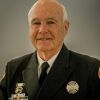When fire departments embrace the accreditation process and fire officers embrace higher and continuing education, the fire service will reach a point of being seen as a true profession.
Webster’s dictionary defines a profession as “an occupation requiring specialized knowledge and often intense academic preparation.” It goes on to define a professional as “one conforming to the technical or ethical standards of a profession.”
While I know these are simplified definitions, I believe we have crossed the threshold on both.
Not that many years ago, it was the dream of many at the National Fire Academy to lay the groundwork for the advancement of the fire service and its subsequent recognition as a profession.
Since its inception almost 40 years ago, the U.S. Fire Administration and the National Fire Academy have collected a body of research and knowledge in the Learning Resource Center at the Emmitsburg, Maryland campus. In the LRC, one can explore past research on literally any topic related to our profession.
In more recent years, that body of knowledge has increased and will continue to do so with the experiments and results we have seen from organizations such as the USFA, NFPA, NIST and UL. One only has to look at the latest literature and practical applications of the Firefighter Safety Through Advanced Research projects to know we are in the midst of an explosion of knowledge that will lead to ongoing change in our approach to everything from fire tactics to medical intervention.
Doctors and firefighters
Let’s look at this from an historic perspective by comparing medicine with the fire service. Few people realize that less than 200 years ago being a physician did not hold the aura and awe that it does today.
In fact, academics as late as the late 19th century felt that the term doctor was reserved for one who studied the classical subjects of the arts, philosophy, theology, literature and language.
Most 18th and 19th century citizens in the United States never saw a physician or doctor. Instead they used a midwife or barber-surgeon for everything from childbirth to dental work to surgery.
Compare that with the fire service. In the 18th and 19th centuries, the fire service consisted of volunteers throughout small local areas who initially used buckets, hooks, ladders and if lucky a hand pumper to try to control fires.
Both professions took gigantic steps forward with the experience they gained in the Civil War. In less than four years, physicians and surgeons had a lifetime of experience learning physiology by trial and error on the battlefield.
In the same manner, the war brought home trained and disciplined veterans from both sides in the hundreds of thousands, making the transition to career firefighters in urban areas far easier, and the use of new technology such as the steam engine more practical.
A profession by any other name …
In the 20th and 21st centuries, the dawn of the Information Age, data analysis and epidemiology has given us a more accurate picture of both the causes and cures of disease. Likewise, it has given us the causes and prevention of injuries, fires and natural disasters.
Those studies have truly taken the field of medicine into a profession, as well as put the fire service on the threshold of the same. If you have any wonder, just look at what we can do as EMTs or paramedics now compared with what we did just a decade ago or back in the retro days of Johnny and Roy on “Emergency!”
If you are still skeptical whether we are as yet a profession, look at what milestones must be marked for a vocation to become a true profession and check them off as you go.
- An occupation becomes a full-time occupation.
- The establishment of a training academy.
- The establishment of a university under graduate and post-graduate curriculum.
- The establishment of local and national associations.
- The introduction of codes of professional ethics.
- The establishment of state certification or licensing.
There are six important characteristics once an occupation is established as a profession. See how many line up with the fire service.
- It renders a service based upon advanced, specialized knowledge and skills, dealing with its problems primarily intellectually rather than through manual labor.
- It involves a confidential relationship between a practitioner and a client or an employer.
- It is charged with a substantial degree of public obligation by virtue of its profession of specialized knowledge.
- It enjoys a common heritage of knowledge, skill and status that professionals are bound to contribute to through individual and collective efforts.
- It performs its services mostly in the public’s interest, receiving its compensation through limited fees rather than direct profit from the improvement in goods, services or knowledge.
- It is bound by a distinct ethical code in its relationships with clients, colleagues and the public.
So why do I feel so passionate about the fire service becoming a profession?
Until we believe that we are a profession and use our academic standing, whether through university degrees, higher education or professional designations, administrators, managers or elected officials will never realize that our job is 90 percent cerebral and 10 percent brawn — and not vice versa.
It is also the way that we take the initiative to determine the direction of the fire service throughout the 21st century.
Wouldn’t it be interesting to look into the future and see the reaction to this article by fire service leaders in the year 2116? By then our destiny will have been set for another 100 years.
More than ever, we need to realize that we’ve already crossed the threshold and that today we are a profession to uphold for ourselves and those who will come after us.













